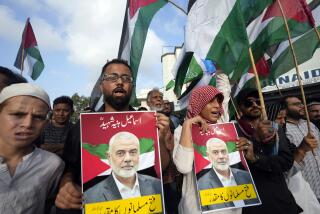16 Die in Suicide Attack in Israel
- Share via
RISHON LE ZION, Israel — A Palestinian with a large bomb strapped to his waist blew himself up inside a crowded pool hall here Tuesday night, police said, killing at least 15 Israelis and ravaging U.S. efforts to push Israelis and Palestinians into peace talks.
More than 50 people were injured in the blast, which coincided with a meeting in Washington between Israeli Prime Minister Ariel Sharon and President Bush. Sharon cut short the trip and was to head home to plan Israel’s response, which likely will target Palestinian Authority President Yasser Arafat.
The force of the explosion split the facade from the three-story building in a gritty industrial neighborhood of this city just south of Tel Aviv and collapsed the ceiling of the top floor.
Rescue teams scoured the wreckage in search of victims believed buried in the rubble. Wounded people staggered, moaning and crying, from the Sheffield Snooker Club and Cafeteria. The Palestinian man apparently detonated his nail-studded bomb at the entrance of the club after taking an elevator to the third floor.
Dozens of ambulances converged on the site, and two construction cranes were positioned above the wreckage to remove bodies. Floodlights from hovering helicopters illuminated the scene as a body could be seen being pulled from the rubble and lowered to the ground.
More than three hours after the attack, medics placed a body into a white vinyl bag at the still chaotic site and loaded it into an ambulance. Dozens of rescue workers crunched on tiny shards of glass that lay in a thick carpet in the parking lot. Cars parked there were wrecked by the force of the blast, their frames twisted and windows pulverized.
“People were screaming. People were calling for their friends they could not find. One woman would not stop screaming that her friend had died,” said David Tabakuli, 42, a salesman who was on his way home when the bomber hit. The explosion was so powerful that he thought his car had been rear-ended by a truck.
He summed up the deep hopelessness that has seized many people in Israel: “It must stop. But if there is no talk, then it’s the guns that will talk.”
Across the street, Yossi Dvir, 38, shook his head as he leaned over a police barricade, surveying the destruction. He knew this would be coming, Dvir said.
“How many people did we kill” in the West Bank during the invasion the Israeli army launched March 29, he asked. “Now they will revenge, the Arabs, they will revenge their brothers and sisters. They are coming here, and this is not the end.”
The radical Islamic Hamas organization claimed responsibility for the bombing, according to a Lebanese television station. In Gaza City, spokesmen for Hamas, which opposes any Palestinian negotiation with Israel, did not immediately confirm the group’s role but said the bombing was a “natural reaction to Israel’s war crimes.”
Israel, however, blamed Arafat and said the attack--the first fatal suicide bombing in nearly four weeks after a relentless barrage in March--proved that the army’s massive West Bank offensive, in which Palestinian cities were wrecked and hundreds of Palestinian men were detained, did not go far enough.
Future retaliation is certain to target Arafat, Israeli analysts said. Sharon’s government has been steadily building a case against the Palestinian leader, attempting to implicate him directly in terrorism to justify his eventual deportation. Sharon steadfastly refuses to deal with him, and a new outbreak of violence will provide the justification for attacking Arafat directly, analysts said.
Israeli security officials speculated that the snooker-club bomber, though not immediately identified, probably came from the Gaza Strip. The recent offensive, with the stated goal of rooting out “terrorist infrastructure,” focused on the West Bank and left Gaza relatively untouched.
After invading West Bank cities and towns, Israeli forces remain only in Bethlehem, where a standoff at the Church of the Nativity continued to elude resolution early today.
“It appears we pulled out too soon,” Public Security Minister Uzi Landau said Tuesday as he rushed to the site of the bombing. “Most of the work is still ahead of us. This is like putting out a brush fire: If you don’t finish and [you] leave embers, the fire will rekindle. This is what is happening now.”
The Palestinian Authority, in an unusually strongly worded statement, referred to suicide bombings as “terrorist crimes” and threatened to “take firm and strict measures against those who are involved in this operation.” Arafat’s government said it “will not be light-handed in punishing those who have caused great harm to our cause.”
The snooker club was a popular hangout for teens but also attracted older Israelis who played its slot machines for 1 shekel a turn. It did not have a guard, police said, despite new laws requiring entertainment establishments to hire security in the wake of suicide bombings that have killed dozens of Israelis.
Patrons never imagined that a guard would be necessary. Rishon Le Zion has remained relatively free of the attacks that have plagued other parts of Israel.
“It [the club] was the sort of place where everyone knew everyone else,” said Alik Moshiashzili, 33, a clothing warehouse manager. “It was small. We all knew each other, and nobody believed that something like this could happen in a place like this.”
The government will almost certainly retaliate in great force. Earlier Tuesday, army Chief of Staff Lt. Gen. Shaul Mofaz told a parliamentary committee that the next wave of Palestinian attacks would unleash an offensive even more punishing than the one just concluded.
Sharon also will come under intense domestic pressure to crack down. Israeli television Tuesday night gave split-screen coverage to Sharon’s meeting with Bush on one side and the scenes of the latest carnage live from Rishon Le Zion on the other side.
“The need for Palestinian reforms is now obvious,” said Interior Minister Eli Yishai, who was traveling with Sharon. “It is more and more apparent, even without this, there is simply no one to talk to.”
By “reforms,” Yishai and other members of the Sharon government are believed to mean an elimination of Arafat from the Palestinian leadership and replacement of the current regime with a more cooperative and less corrupt one.
In his meeting with Sharon, Bush was able to “register his disgust at this wanton taking of innocent life,” said White House National Security Advisor Condoleezza Rice.
Bush was effusive in his praise for and support of Sharon and echoed the Israeli leader almost to the word in his criticism of the Palestinian Authority and demands that it change its ways. Israeli television journalists traveling with Sharon said Bush sounded as though he belonged to an Israeli government public relations team.
Curtius reported from Rishon Le Zion and Wilkinson from Jerusalem.
More to Read
Sign up for Essential California
The most important California stories and recommendations in your inbox every morning.
You may occasionally receive promotional content from the Los Angeles Times.














